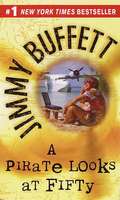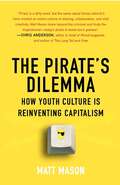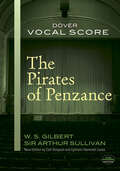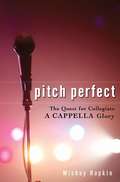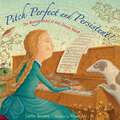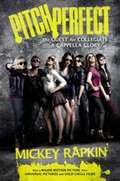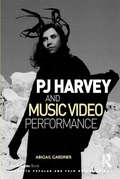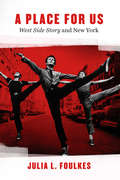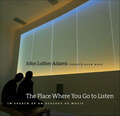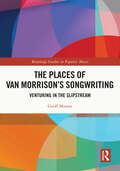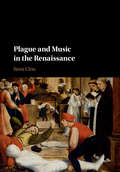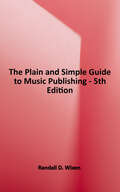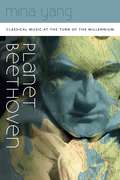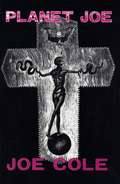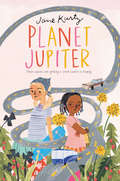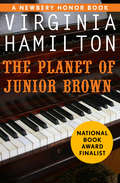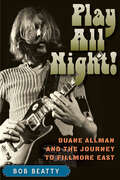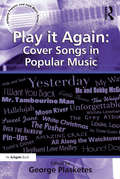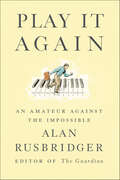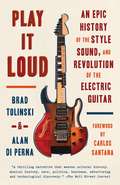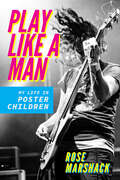- Table View
- List View
A Pirate Looks at Fifty
by Jimmy BuffettBuffett takes the occasion of his 50th birthday to tell us about himself, doing so with candor and modesty, talking about his marriage, his children and 'a lot of things on the good old planet Earth'
The Pirate's Dilemma: How Youth Culture Is Reinventing Capitalism
by Matt MasonIt started with punk. Hip-hop, rave, graffiti, and gaming took it to another level, and now modern technology has made the ideas and innovations of youth culture increasingly intimate and increasingly global at the same time. In The Pirate's Dilemma, VICE magazine's Matt Mason -- poised to become the Malcolm Gladwell of the iPod Generation -- brings the exuberance of a passionate music fan and the technological savvy of an IT wizard to the task of sorting through the changes brought about by the interface of pop culture and innovation. He charts the rise of various youth movements -- from pirate radio to remix culture -- and tracks their ripple effect throughout larger society. Mason brings a passion and a breadth of intelligence to questions such as the following: How did a male model who messed with disco records in the 1970s influence the way Boeing designs airplanes? Who was the nun who invented dance music, and how is her influence undermining capitalism as we know it? Did three high school kids who remixed Nazis into Smurfs in the 1980s change the future of the video game industry? Can hip-hop really bring about world peace? Each chapter crystallizes the idea behind one of these fringe movements and shows how it combined with technology to subvert old hierarchies and empower the individual. With great wit and insight -- and a cast of characters that includes such icons as the Ramones, Andy Warhol, Madonna, Russell Simmons, and 50 Cent -- Mason uncovers the trends that have transformed countercultural scenes into burgeoning global industries and movements, ultimately changing our way of life.
The Pirates of Penzance Vocal Score
by W. S. Gilbert Carl Simpson Ephraim Hammett Jones Sir Arthur SullivanThis exemplary new edition of the vocal score of an enchanting operetta -- which has delighted audiences for over a century with its catchy melodies, its witty lyrics, and its madcap tale of tender-hearted pirates, timid policemen, and the demands of duty -- was prepared by musicologists Carl Simpson and Ephraim Hammett Jones, who returned to original manuscripts and early sources to produce handsome, newly engraved plates closest to Gilbert and Sullivan's original intentions. All of the voice parts appear here, in addition to a piano reduction of the full score and the complete libretto. Introduction by the editors. Contents. Instrumentation.
Pitch Perfect: The Quest for Collegiate A Cappella Glory
by Mickey RapkinPitch Perfectis a behind-the-scenes look at the bizarre, often inspiring world of collegiate a cappella groups. The first collegiate a cappella group, the Yale Whiffenpoofs, was founded by Cole Porter back in 1909. But what had been largely an Ivy League phenomenon has, in the past fifteen years, exploded. And it’s not what you think. There are now more than 1,200 a cappella groups at colleges across the country. The very best of these collegiate groups square off in the annual International Championship of Collegiate A Cappella—a showdown marked by wrenching close calls and exhilarating triumphs. And, really, where else can you hear Michael Jackson’s “Bad” in four-part harmony? In Pitch Perfect, GQ editor Mickey Rapkin follows a season in a cappella through all its twists and turns, covering the breathtaking displays of vocal talent, the groupies (yes, a cappella singers have groupies), the rockstar partying (and run-ins with the law), and all the bitter rivalries. Along the way are encounters with boldfaced names such as President George W. Bush, Prince, David Letterman, Barack Obama, Barbra Streisand, Hillary Clinton, Marisa Tomei, Amanda Bynes, Nick Lachey, Merv Griffin, Jim Carrey, Microsoft’s Paul Allen, John Legend, and Jessica Biel. At the heart of the narrative are three a cappella groups whose interactions are anything but harmonious: the historic Tufts Beelzebubs, founded more than forty years ago with 40,000 albums sold since—and struggling to record a new album that lives up to the hype; Divisi of the University of Oregon, a relatively new, all-female group attempting to overcome a loss in the 2005 championship; and the University of Virginia Hullabahoos, the so-called bad boys of collegiate a cappella, who will attempt to compete on a higher level this year while retaining their casual soul. Bringing a lively new twist to America’s fascination with talent showdowns and peerless performers, Pitch Perfect is sure to strike a chord with readers.
Pitch Perfect and Persistent!: The Musical Debut of Amy Cheney Beach
by Caitlin DeLemsDiscover the untold yet inspiring story of Amy Beach, musician extraordinaire and the first successful woman composer in America.With perfect pitch and fierce persistence, Amy Beach always knew she had to make music. There was just one BIG problem. Her mother believed it was not proper or suitable for a young lady to draw attention to herself, let alone take on a musical career. But give in or give up? Not Amy Beach. She demanded to play the piano. Demanded to have a real teacher. Demanded to perform. Luckily—for the world!—Amy&’s persistence paid off. At just sixteen years old, Amy Beach found herself on the stage of Boston&’s Music Hall—and the start of a brilliant career. A female composer who paved the way—perfectly!
Pitch Perfect (movie tie-in)
by Mickey RapkinA musical tale of collegiate a cappella filled of high notes, high drama, and high jinks is now a major motion picture. Get ready to be pitch slapped. The roots of unaccompanied vocal music stretch all the way back to Gregorian chants of the Middle Ages, and collegiate a cappella is over a century old. But what was once largely an Ivy League phenomenon has, in the past twenty years, exploded. And it's not what you think. Though the blue blazers and khakis may remain, a cappella groups at colleges across the country have become downright funky. In Pitch Perfect, journalist Mickey Rapkin follows a season in a cappella through all its twists and turns, covering the breathtaking displays of vocal talent, the groupies (yes, there are a cappella groupies), the rock-star partying, and all the bitter rivalries. Rapkin brings you into the world of collegiate a cappella characters--from movie-star looks and celebrity-size egos to a troubled new singer with the megawatt voice. Including encounters with a cappella alums like John Legend and Diane Sawyer and fans from Prince to presidents, Rapkin shows that a cappella isn't for the faint of heart--or lungs. Sure to strikea chord with fans of Glee and The Sing-Off, this raucous story of a cappella rock stars shows that sometimes, to get that perfect harmony, you have to embrace a little discord.
The Pixies: The Secret History (The\secret History Of Rock Ser.)
by Alan CrossAlan Cross is the preeminent chronicler of popular music.Here he provides a history of trailblazing grunge band The Pixies.This look at the band—"Music from the Planet of Sound"—is adapted from the audiobook of the same name.
PJ Harvey and Music Video Performance (Ashgate Popular and Folk Music Series)
by Abigail GardnerPJ Harvey’s performances are premised on the core contention that she is somehow causing ’trouble’. Just how this trouble can be theorised within the context of the music video and what it means for a development of the ways we might conceptualise ’disruption’ and think about music video lies at the heart of this book. Abigail Gardner mixes feminist theory and critical models from film and video scholarship as a rich means of interrogating Harvey’s work and redefining her disruptive strategies. The book presents a rethinking of the masquerade that allies it to cultural memory, precipitated by Gardner’s claim that Harvey’s performances are conversations with the past, specifically with visualised memories of archetypes of femininity. Harvey’s masquerades emerge from her conversations and renegotiations with both national and transatlantic musical, visual and lyrical heritages. It is the first academic book to present analysis of Harvey’s music videos and opens up fresh avenues into exploring what is at stake in the video work of one of Britain’s premier singer-songwriters. It extends the discussion on music video to consider how to make sense of the rapidly developing digital environment in which it now sits. The interdisciplinary nature of the book should attract readers from a range of subject areas including popular music studies, cultural studies, media and communication studies, and gender studies.
A Place for Us: “West Side Story” and New York
by Julia L. FoulkesFrom its Broadway debut to the Oscar-winning film to countless amateur productions, West Side Story is nothing less than an American touchstone--an updating of Shakespeare vividly realized in a rapidly changing postwar New York. That vision of postwar New York is at the heart of Julia L. Foulkes's A Place for Us. A lifelong fan of the show, Foulkes became interested in its history when she made an unexpected discovery: scenes for the iconic film version were shot on the demolition site destined to become part of the Lincoln Center redevelopment area--a crowning jewel of postwar urban renewal. Foulkes interweaves the story of the creation of the musical and film with the remaking of the Upper West Side and the larger tale of New York's postwar aspirations. Making unprecedented use of director and choreographer Jerome Robbins's revelatory papers, she shows the crucial role played by the political commitments of Robbins and his fellow gay, Jewish collaborators, Leonard Bernstein and Arthur Laurents. Their determination to evoke life in New York as it was actually lived helped give West Side Story its unshakable sense of place even as it put forward a vision of a new, vigorous, determinedly multicultural American city. Beautifully written and full of surprises for even the most dedicated West Side Story fan, A Place for Us is a revelatory new exploration of an American classic.
The Place Where You Go to Listen: In Search of an Ecology of Music
by John Luther AdamsDid Alaska create the music of John Luther Adams, or did the music create his Alaska? For the past thirty years, the vastness of Alaska has swept through the distant reaches of the composer's imagination and every corner of his compositions. In this new book Adams proposes an ideal of musical ecology, the philosophical foundation on which his largest, most complex musical work is based. This installation, also called The Place Where You Go to Listen, is a sound and light environment that gives voice to the cycles of sunlight and darkness, the phases of the moon, the seismic rhythms of the earth, and the dance of the aurora borealis. Adams describes this work as "a place for hearing the unheard music of the world around us." The book includes two seminal essays, the composer's journal telling the story of the day-to-day emergence of The Place, as well as musical notations, graphs and illustrations of geophysical phenomena.
The Places of Van Morrison’s Songwriting: Venturing in the Slipstream (Routledge Studies in Popular Music)
by Geoff MunnsWhat can we learn about Van Morrison’s life and work as a songwriter through his songs? This book looks closely at the lyrics and music from a selection of his songs. Some are very well-known - ‘Brown Eyed Girl’, ‘Cleaning Windows’ and ‘The Healing Game’. Others are less familiar. Through these songs the book offers insights into some of the most important ideas that the songwriter has explored across his five-decade plus career, starting from the Them period and extending through his solo albums. These readings show how thinking about Morrison’s use of place provides a specific lens that contributes to a greater understanding of his art. The songs are organized into chapters that reflect many of the important places in Morrison’s work as he ventured professionally and imaginatively away from the places of his upbringing towards a wider musical world. These places are in city streetscapes and country landscapes – in home places of streets and ditches, in the enclosed spaces of rooms, in the expansive reaches of the natural world, in indeterminate and specific foreign lands. A picture emerges of the journey that Van Morrison details through his songs, one that sees him first wandering as a boy through his East Belfast haunts, and then venturing out to a wider world away from this local place.
Plague and Music in the Renaissance
by Remi ChiuPlague, a devastating and recurring affliction throughout the Renaissance, had a major impact on European life. Not only was pestilence a biological problem, but it was also read as a symptom of spiritual degeneracy and it caused widespread social disorder. Assembling a picture of the complex and sometimes contradictory responses to plague from medical, spiritual and civic perspectives, this book uncovers the place of music - whether regarded as an indispensable medicine or a moral poison that exacerbated outbreaks - in the management of the disease. This original musicological approach further reveals how composers responded, in their works, to the discourses and practices surrounding one of the greatest medical crises in the pre-modern age. Addressing topics such as music as therapy, public rituals and performance and music in religion, the volume also provides detailed musical analysis throughout to illustrate how pestilence affected societal attitudes toward music.
The Plain & Simple Guide to Music Publishing, 5th Edition
by Randall D. WixenMusic publishing is one of the most complex parts of the music business, and yet it can be the most lucrative area of income for musicians. Expert and industry veteran Randall Wixen presents a clear, concise approach on how music publishing works today. It is written for the lay musician/songwriter but contains enough substance to be worthwhile for those already holding positions within the business. Includes a foreword by Tom Petty. Topics covered include everything from mechanical, performing, and sync rights to sub-publishing, foreign rights, copyright basics, types of publishing deals, advice on representation, and more.
Planet Beethoven
by Mina YangIn Planet Beethoven, Mina Yang makes the compelling case that classical music in the twenty-first century is just as vibrant and relevant as ever--but with significant changes that give us insight into the major cultural shifts of our day. Perusing events, projects, programs, writings, musicians, and compositions, Yang shines a spotlight on the Western art music tradition. The book covers an array of topics, from the use of Beethoven's "Für Elise" in YouTube clips and hip-hop, to the marketing claims of Baby Einstein products, and the new forms of music education introduced by Gustavo Dudamel, conductor of the Los Angeles Philharmonic. While the book is global in its outlook, each chapter investigates the unique attributes of a specific performer, performance, or event. One chapter reflects on Chinese pianist Yuja Wang's controversial performance at the Hollywood Bowl, another explores the highly symbolic Passion 2000 Project in Stuttgart, Germany. Sure to be of interest to students, professionals, and aficionados, Planet Beethoven traces the tensions that arise from the "classical" nature of this tradition and our rapidly changing world.Ebook Edition Note: One image has been redacted.
Planet Joe
by Joe ColeLife on the road as seen through the eyes of Black Flag/Rollins Band roadie and Rollins confidante, Joe Cole. Tour journal documenting the final Black Flag tour and first Rollins Band tour.
Planet Jupiter
by Jane KurtzJupiter is used to being a planet of one, and she likes it that way. But then a cousin, who Jupiter never even knew existed, comes from Ethiopia to stay for the summer, and Jupiter is put in charge of taking care of her. A lyrical and memorable story of family, friendship, and community—perfect for fans of Katherine Hannigan’s Ida B and Holly Goldberg Sloan’s Counting by 7s.Jupiter and her family have spent their lives on the road, moving from town to town in a trusty old van and earning their living by playing music for tourists. But when their van breaks down, Jupiter’s mother rents an actual house in Portland for the summer so Jupiter’s annoying cousin Edom, recently adopted from Ethiopia, can stay with them. Luckily, Edom doesn’t want to be in Portland any more than Jupiter wants her there, and the two hatch a Grand Plan to send Edom back to her mother. In the process, Jupiter learns that community and family aren’t always what you expect them to be.A sweet, genuine story with themes of community, immigration, finances, family, and taking care of the environment that will appeal to fans of Cynthia Lord and Lynda Mullaly Hunt.
The Planet of Junior Brown: Zeely / The House Of Dies Drear / The Planet Of Junior Brown / M. C. Higgins, The Great / Sweet Whispers, Brother Rush
by Virginia HamiltonJunior Brown is a musical prodigy losing touch with reality and everyone around him—except for one important friend Junior Brown is different than the other kids in his eighth-grade class. For one, he weighs three hundred pounds. He&’s also a talented musician with a serious future as a professional pianist—if he survives middle school. With an overbearing mom, disappointed teachers, and fellow students who tease him mercilessly, Junior starts to slip away into his own mind. His last hope may be his only friend, Buddy Clark, a boy in his class without a home or family who has already learned some of life&’s toughest lessons.
Planetario
by Julián LópezEl actor y cómico Julián López debuta en el panorama literario con una novela llena de sonidos y melodías, de emotividad y pequeños momentos, de tradición y modernidad. Un abuelo y su nieto tienden un puente en el que la música se convierte en refugio contra el alzhéimer y el olvido. Y los dos se dejan llevar por el hilo musical de toda una vida. Jota recorre la memoria de un tiempo en un pequeño pueblo del interior. Una infancia y una adolescencia marcadas por el amor hacia la música clásica y el descubrimiento de la voz de Freddie Mercury y las canciones de Queen. Planetario es una crónica sentimental sobre la vida en un pueblo de la España vacía durante los años ochenta y noventa, y sobre el poder evocador de la música.
Platformed! How Streaming, Algorithms and Artificial Intelligence are Shaping Music Cultures (Pop Music, Culture and Identity)
by Tiziano Bonini Paolo MagauddaGrounded in more than a decade of field research, this book uses empirical examples, quantitative data, and qualitative interviews with young music consumers as well as music industry professionals to understand how the platforms behind music production, distribution and listening work in our digital society. Bringing together the perspectives from science and technology studies, media studies, and the political economy of digital platforms, the book outlines the process of mutual construction between music digital platforms and the cultural value of music in today’s society, and also reflects on the complicated relationship between the power of platforms and the agency of listeners.
Play All Night!: Duane Allman and the Journey to Fillmore East
by Bob BeattyThe origin story of a groundbreaking album The 1971 Allman Brothers Band album At Fillmore East was a musical manifesto years in the making. In Play All Night!, Bob Beatty dives deep into the motivations and musical background of band founder Duane Allman to tell the story of what made this album not just a smash hit, but one of the most important live rock albums in history. Featuring insights from bootleg tapes, radio ads, early reviews, never-before-published photos, and the memories of band members, fans, and friends, Beatty chronicles how Allman rejected the traditional route of music business success—hit singles and record sales—and built a band that was at its best jamming live on stage, feeding off the crowd’s energy, and pushing each other to new heights of virtuosic improvisation. Every challenge, from recruiting a group of relatively unknown but established musicians like Jaimoe and Dickey Betts, touring the American South as an interracial band, and the failure of their first two studio albums, sharpened Allman’s determination to pursue the band’s truly unique sound. He made a bold choice—to record their next album live at Bill Graham’s famous concert hall in New York’s Lower East Side, a gamble that launched a new strand of American music to the top of the charts. Four days after the album went gold, Duane Allman was killed in a motorcycle accident. He was 24. This book explores how At Fillmore East cemented Allman’s legacy as a strong-willed, self-taught visionary, giving fans of Southern rock and all readers interested in the role of rock music in American popular culture a new appreciation for this pathbreaking album.
Play it Again: Cover Songs In Popular Music (Ashgate Popular and Folk Music Series)
by George PlasketesCovering”the musical practice of one artist recording or performing another composer's song”has always been an attribute of popular music. In 2009, the internet database Second Hand Songs estimated that there are 40,000 songs with at least one cover version. Some of the more common variations of this "appropriationist" method of musical quotation include traditional forms such as patriotic anthems, religious hymns such as Amazing Grace, Muzak's instrumental interpretations, Christmas classics, and children's songs. Novelty and comedy collections from parodists such as Weird Al Yankovic also align in the cover category, as does the "larcenous art" of sampling, and technological variations in dance remixes and mash-ups. Film and television soundtracks and advertisers increasingly rely on versions of familiar pop tunes to assist in marketing their narratives and products. The cover phenomenon in popular culture may be viewed as a postmodern manifestation in music as artists revisit, reinterpret and re-examine a significant cross section of musical styles, periods, genres, individual records, and other artists and their catalogues of works.The cover complex, with its multiple variations, issues, contexts, and re-contextualizations comprises an important and rich popular culture text. These re-recordings represent artifacts which embody artistic, social, cultural, historical, commercial, biographical, and novel meanings. Through homage, allusion, apprenticeship, and parody, among other modes, these diverse musical quotations express, preserve, and distribute popular culture, popular music and their intersecting historical narratives. Play it Again represents the first collection of critical perspectives on the many facets of cover songs in popular music.
Play It Again: An Amateur Against the Impossible
by Alan RusbridgerThe Guardian editor and amateur pianist’s account of a remarkable musical challenge during an extraordinary year for news.As editor of the Guardian, one of the world’s foremost newspapers, Alan Rusbridger lives by the relentless twenty-four-hour news cycle. But increasingly in midlife, he feels the gravitational pull of music—especially the piano. He sets himself a formidable challenge: within a year, to fluently learn Chopin’s magnificent Ballade No. 1 in G minor, arguably one of the most difficult Romantic compositions in the repertory. With pyrotechnic passages that require feats of memory, dexterity, and power, the piece is one that causes alarm even in battle-hardened concert pianists.Under ideal circumstances, this would have been a daunting task. But the particular year Rusbridger chooses turns out to be one of frenetic intensity, beginning with WikiLeaks’ massive dump of state secrets and ending with the Guardian’s revelations about widespread phone hacking at News of the World. “In between, there were the Japanese tsunami, the Arab Spring, the English riots . . . and the death of Osama Bin Laden,” writes Rusbridger. The test would be to “nibble out” twenty minutes per day to do something totally unrelated to these events.Rusbridger’s subject is larger than any one piece of music: Play It Again deals with focus, discipline, and desire but is, above all, about the sanctity of one’s inner life in a world dominated by deadlines and distractions.Praise for Play It Again“An absorbing, adroitly crafted tale of humility, discipline and the sheer love of music . . . [Alan Rusbridger’s] triumph is an inspiration.” —Katie Hafner, The New York Times Book Review“A unique mélange of political and musical reportage . . . [Alan Rusbridger] illuminates not only print media in this digital age but also the changing role of the music within.” —Iain Burnside, The Observer (London)
Play It Loud: An Epic History of the Style, Sound, and Revolution of the Electric Guitar
by Alan Di Perna Brad Tolinski Carlos SantanaBy the longtime editor-in-chief of Guitar World and a veteran rock journalist, an unprecedented history of the electric guitar, its explosive impact on music and culture, and the people who brought it to life.Spanning a century and encompassing some of guitar's greatest builders and players, from Les Paul to Keith Richards to Eddie Van Halen, Brad Tolinski and Alan di Perna bring the evolution of the guitar to roaring life. This is a story of inventors and iconoclasts, of scam artists, prodigies and mythologizers, as varied and original as the music they spawned. Play It Loud uses twelve landmark instruments, each of them a milestone in the progress of the electric guitar, to illustrate the chaos, conflict and passion it has inspired. It introduces Leo Fender, a man who couldn't play a note, but whose innovation helped transform the classical guitar into the explosive sound machine it is today. Some of the most significant social movements of the 20th century are indebted to the guitar: it was an essential part of Beatlemania and Woodstock; a mirror to the rise of the teenager as a social force; a linchpin of the punk movement's sound and ethos. And today the guitar has come full circle, with contemporary titans such as Jack White of The White Stripes and Dan Auerbach of The Black Keys bringing some of those earliest electric guitar forms back to the limelight. For generations, the electric guitar has been an international symbol of freedom, danger and hedonism. Play It Loud is the story of how a band of innovators transformed a simple notion into a singular cultural force.
Play It Loud: An Epic History of the Style, Sound, and Revolution of the Electric Guitar
by Brad Tolinski Carlos Santana Alan Di PernaAn unprecedented history of the electric guitar, its explosive impact on music and culture, and the players and builders who brought it to life For generations the electric guitar has been an international symbol of freedom, danger, rebellion, and hedonism. In Play It Loud, veteran music journalists Brad Tolinski and Alan di Perna bring the history of this iconic instrument to roaring life. It's a story of inventors and iconoclasts, of scam artists, prodigies, and mythologizers as varied and original as the instruments they spawned.Play It Loud uses twelve landmark guitars--each of them artistic milestones in their own right--to illustrate the conflict and passion the instruments have inspired. It introduces Leo Fender, a man who couldn't play a note but whose innovations helped transform the guitar into the explosive sound machine it is today. Some of the most significant social movements of the twentieth century are indebted to the guitar: It was an essential element in the fight for racial equality in the entertainment industry; a mirror to the rise of the teenager as social force; a linchpin of punk's sound and ethos. And today the guitar has come full circle, with contemporary titans such as Jack White of The White Stripes, Annie Clark (aka St. Vincent), and Dan Auerbach of The Black Keys bringing some of the earliest electric guitar forms back to the limelight.Featuring interviews with Les Paul, Keith Richards, Carlos Santana, Eddie Van Halen, Steve Vai, and dozens more players and creators, Play It Loud is the story of how a band of innovators transformed an idea into a revolution.From the Hardcover edition.
Play Like a Man: My Life in Poster Children (Music in American Life)
by Rose MarshackAs a member of Poster Children, Rose Marshack took part in entwined revolutions. Marshack and other women seized a much-elevated profile in music during the indie rock breakthrough while the advent of new digital technologies transformed the recording and marketing of music. Touring in a van, meeting your idols, juggling a programming job with music, keeping control and credibility, the perils of an independent record label (and the greater perils of a major)—Marshack chronicles the band’s day-to-day life and punctuates her account with excerpts from her tour reports and hard-learned lessons on how to rock, program, and teach while female. She also details the ways Poster Children applied punk’s DIY ethos to digital tech as a way to connect with fans via then-new media like pkids listservs, internet radio, and enhanced CDs. An inside look at a scene and a career, Play Like a Man is the evocative and humorous tale of one woman’s life in the trenches and online.
